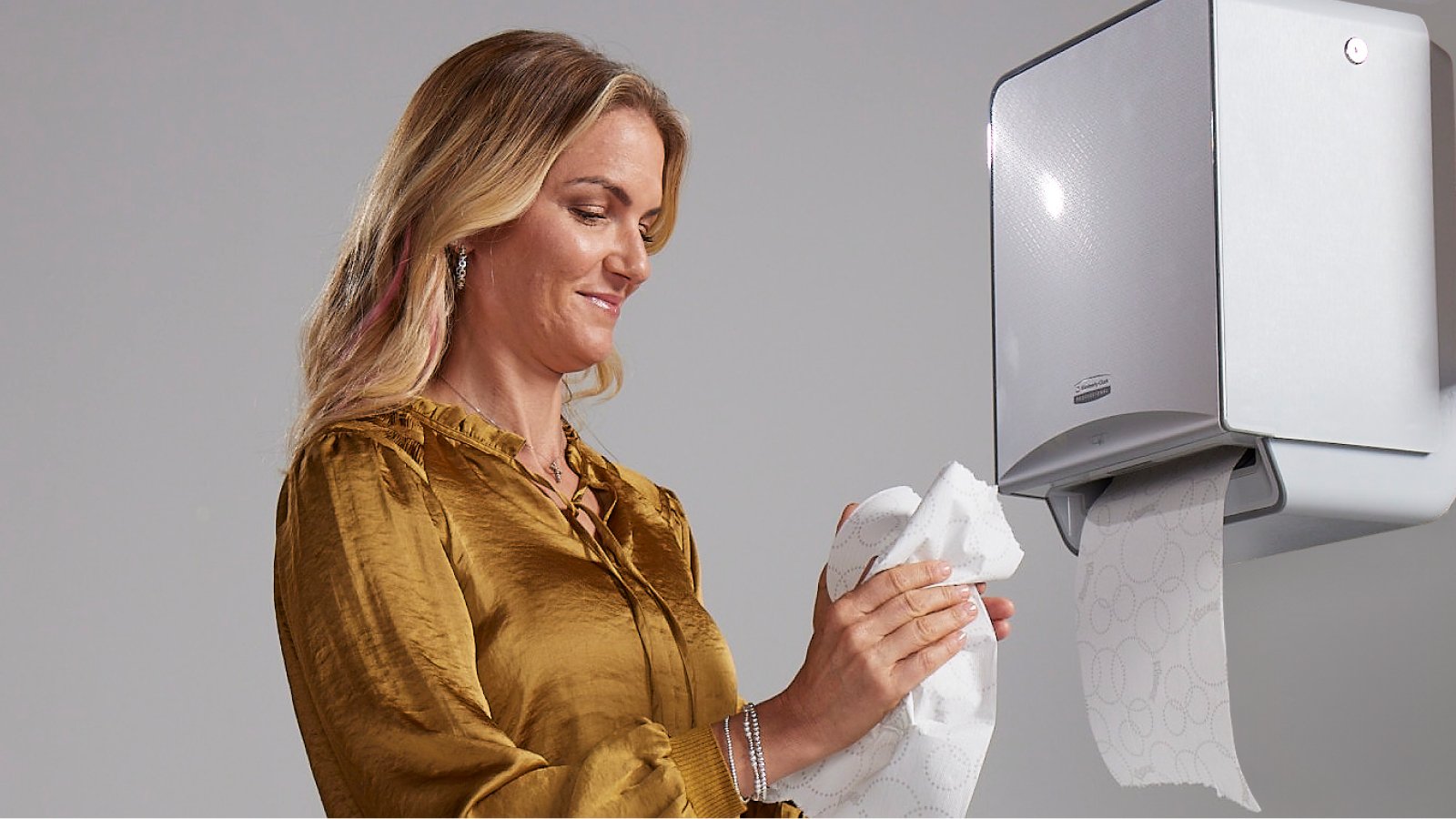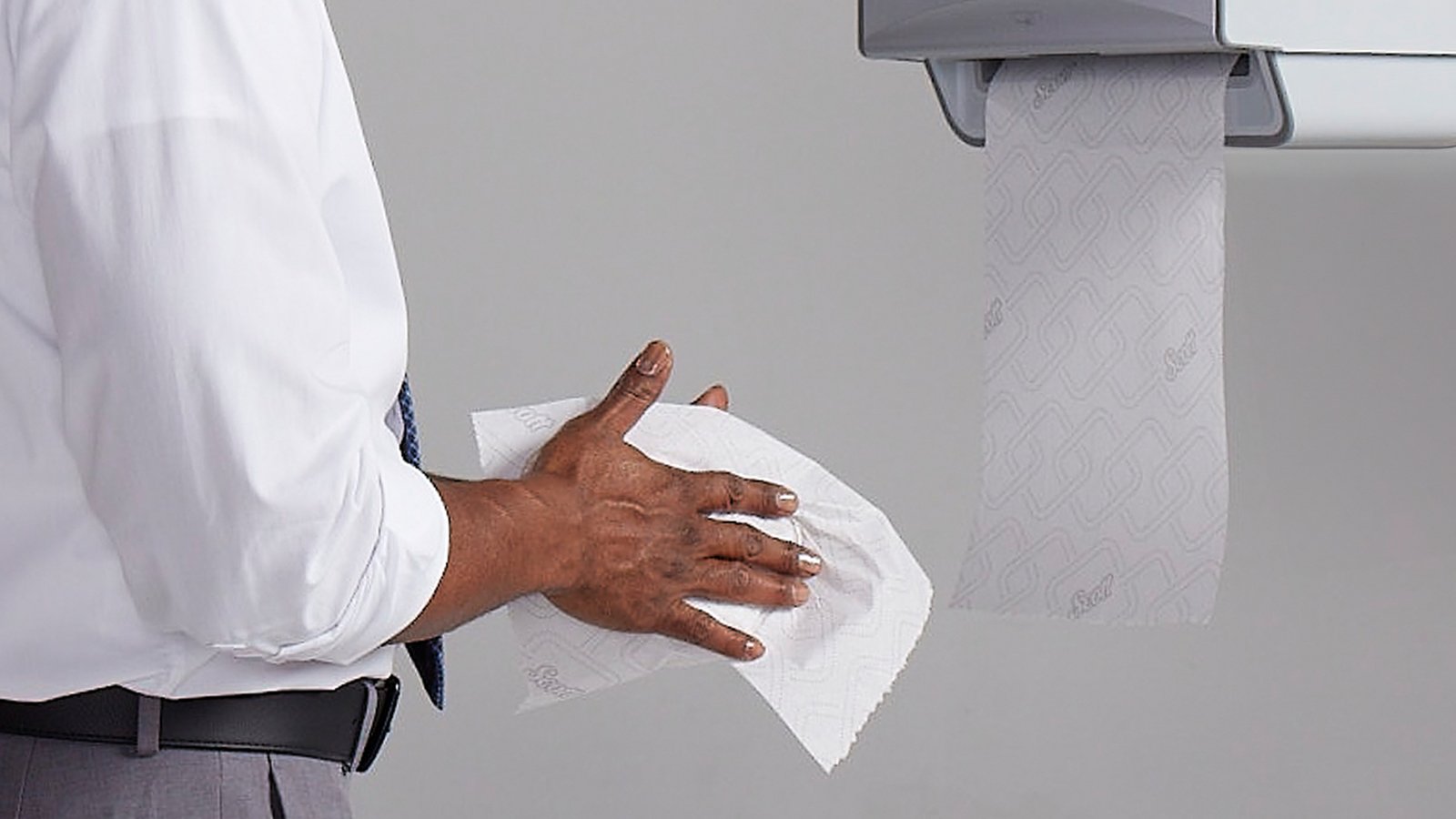Last Updated JULY 2024
Enhancing Washroom Experience: Benefits of Single-Use Paper Towels
Looking to enhance the washroom experience? Uncover why single-use paper towels outshine jet air dryers and how prioritising hygiene excellence can improve customer satisfaction.

When it comes to customer experience, every detail counts, and none more so than the state of your washroom facilities. It's not just about cleanliness; it's about signaling to your patrons that their well-being matters.
Among the arsenal of tools to achieve this, the choice between single-use paper towels and jet air dryers stands out as a pivotal decision. Despite the allure of modern technology, studies consistently reveal a clear preference for single-use paper towels. When faced with a choice of drying methods, 90% of people chose paper towels over jet air dryers in the washroom.1
Let's delve deeper into why this preference persists and how it impacts both hygiene and customer satisfaction.

Understanding the Human Behaviour Gap
One key factor often overlooked in the debate over hand-drying methods is how people behave. Despite experts recommending a 60-second drying time when using jet air dryers to ensure thorough drying, studies show that most individuals will only dry their hands for 30 seconds.
This reality is made worse during peak washroom traffic when people will rush the handwashing process or even abandon it altogether, increasing the risk of cross-contamination.
Why does this matter?
Damp hands are prime breeding grounds for germs and bacteria, and moisture provides an optimal environment for bacteria
to flourish. When individuals with damp hands touch surfaces, they can easily transfer bacteria onto
them.
Understanding how our actions impact hygiene underscores the importance of proper hand-drying practices in mitigating the spread of bacteria in public spaces.2
The Efficiency of Paper Towels
Single-use paper towels emerge as champions in the battle against time and hygiene. Offering a quick and efficient solution, patrons can quickly and easily dry their hands as they exit the washroom — without compromising on cleanliness.
Unlike the lingering uncertainty of partially dried hands after using a jet air dryer, single-use paper towels ensure a thorough drying process. Also, the tactile act of rubbing hands with a paper towel not only removes moisture but also physically dislodges bacteria, further improving hand hygiene.3
Elevating Customer Experience: 6 CX Factors
Beyond mere functionality, the preference for paper towels is rooted in customer experience (CX).
Let's break down the key reasons driving this preference:
Reduced Wait Times:
In environments with high foot traffic, every second counts. Paper towels play a crucial role in speeding up the hand-drying process, reducing congestion and ensuring a smoother flow of washroom traffic. It’s more than convenience; it's a strategic move to enhance user satisfaction and operational efficiency. Shorter lines translate to happier customers and smoother operations. By reducing lines, facilities can make better use of space, allocate staff resources more effectively and streamline operations.
Decreased Noise Pollution:
Selecting paper towels over jet air dryers offers a quieter and less disruptive solution, addressing the bothersome noise often associated with hand dryers. Jet air dryers typically produce noise levels around 85 dB, comparable to city traffic or a food blender. While adults may tolerate this noise, it impacts children more significantly since air dryers are often positioned at a child’s ear height.
Research indicates that some hand dryer can even reach up to 121 dB.4 Although this noise level is unlikely to cause hearing damage due to the brief operation time, it can be much more disruptive for children as they have anatomical and physiological differences making their hearing more sensitive and loud noises more jarring.
Opting for paper towels can help facilities reduce the negative impact of noisy hand dryers, creating a more positive washroom experience that prioritises user well-being without compromising efficiency.
Cross-Contamination Mitigation:
Maintaining washroom hygiene is crucial for both patron well-being and facility reputation. Choosing single-use paper towels over jet air dryers is key in achieving this as studies show jet air dryers disperse significantly more germ particles into the air compared to single-use paper towels.
One study found jet air dryers dispersing 1,300 times more germ particles into the surrounding air than paper towels, with 100 times more particles remaining even after 15 minutes.5
Paper towels effectively remove bacteria and moisture, reducing illness transmission risk. Proper hand drying with paper towels can eliminate up to 77% of bacteria remaining on the hands after washing.6 Prioritising cross-contamination mitigation with paper towels underscores a facilities' commitment to hygiene.
Maintenance Simplicity:
In facility management, simplicity often equals efficiency. Paper towels offer a straightforward solution that minimises the complexities associated with maintaining jet air dryers. Jet air dryers demand daily cleaning and servicing to prevent the spread of bacteria-laden air. Training workers and supervisors on proper procedures for jet air dryer maintenance, including regular filter replacement, can be time-consuming and is a cost often overlooked.
Using paper towels enables facility managers to streamline maintenance efforts, decrease operational costs and ensure a hassle-free washroom experience.
Environmental Sustainability:
Despite common misconceptions, single-use paper towels can play a role in supporting your sustainability initiatives. You can easily find towels made from recycled materials and look for items that can be diverted from the landfill and minimise environmental impact via composting.
When choosing a supplier, prioritise those who source paper materials from responsibly managed forests, following Forest Stewardship Council® (FSC®) guidelines. This ensures that paper towels remain a sustainable option without compromising on hygiene standards.

Expanded Functionality:
Beyond hand drying, paper towels offer versatility in cleaning tasks, simplifying purchasing and inventory management. They serve as a multi-purpose cleaning tool, allowing facilities to streamline their cleaning supplies and reduce complexity in procurement. With paper towels readily available for various cleaning needs, facilities can enhance efficiency and maintain a clean, hygienic environment seamlessly.
One study found jet air dryers dispersing 1,300 times more germ particles into the surrounding air than paper towels, with 100 times more particles remaining even after 15 minutes.5
The Clear Choice: Single-Use Paper Towels for Enhanced Hygiene
Washroom facilities play a crucial role in customer experience, signalling a commitment to patron well-being and professionalism. While modern technology offers innovative solutions, studies consistently show that the humble single-use paper towel remains a superior choice for their efficiency and hygiene – ultimately enhancing the washroom experience.
For facilities aiming to prioritise both improved cleanliness and customer satisfaction, single-use paper towels are the optimal choice.
Ready to elevate your washroom experience?
Explore our suite of trusted washroom solutions to help increase productivity, reduce waste, and improve employee and customer satisfaction.
1Enhancing Hygiene in the Healthcare Sector with Better Hand Drying. (2023, March 8). KC Professional. https://www.kcprofessional.com/en-gb/-/media/Global/Content%20Hub/Documents/202739504_pdf.pdf
2 Hand Hygiene Basics White Paper. (2023, August 8). KC Professional. https://www.kcprofessional.com/en-gb/-/media/Global/Content%20Hub/Documents/202751437_pdf.pdf
3 Handwashing facts. (2024, April 17). Clean Hands. https://www.cdc.gov/clean-hands/data-research/facts-stats/index.html
4 Keegan, N. L. (2019). Children who say hand dryers ‘hurt my ears’ are correct: A real-world study examining the loudness of automated hand dryers in public places. Paediatrics & Child Health, 25(4), 216–221. https://doi.org/10.1093/pch/pxz046
5 Kimmitt, P. T., & Redway, K. F. (2016). Evaluation of the potential for virus dispersal during hand drying: a comparison of three methods. Journal of Applied Microbiology, 120(2), 478–486. https://doi.org/10.1111/jam.13014
6 Redway, K. (October 2010). Changes in the number of different types of bacteria on the hands before and after drying using paper towel, continuous cloth roller towel, warm air dryer and jet air dryer. University of Westminster. https://europeantissue.com/wp-content/uploads/WU-Study-2010-Report.pdf



















